#queer people playing queer characters is important
Text
actually i'm still thinking about that part of oliver's zach sang interview where he says that he doesn't think of buck as a queer character, he thinks of him as a character that is queer, who has a fully fleshed out personality and a multitude of important characteristics and who has flaws and makes mistakes, just like any real, human person. he's not that bisexual character we shoved in there for representation's sake. he's evan buckley, and his bisexuality is important and undeniable but it's not the only thing that makes him buck. that makes him so loved.
i love it because that's always how 911 has approached queerness, right from the very beginning. when i think of hen, her being a black lesbian isn't the first thing that comes to mind. what comes to mind is her brilliance and her compassion towards the people that she treats. it's the understanding with which she approaches the world. it's how fiercely protective she is of her friends and her loved ones. it's her devotion towards her wife and her family. it's her complicated feelings towards her past and the way that she's learned to heal from the scars that were left. however, hen's identity as a black lesbian is always present. it's never ignored or minimized and the show never tries to diminish how those aspects of who she is would impact her life. her identity as a black woman and a queer woman is always relevant and has played a huge part in making her who she is, but it's never, ever been her sole defining characteristic. she is a fully fledged character, and her queerness has always been allowed to exist and take up space without taking away from anything else that makes her hen.
that is always how representation should be done and i'm so grateful that it's been the norm on 911 right from day one. i'm so grateful for this show, and the love and care with which they've treated our queer characters — hen, karen, michael, david, josh, that beautiful older gay couple that quite literally defined love on this show, that sweet woman who just wanted to pass her driving test, the guy who ended up with a tapeworm in his ass because he couldn't stop eating sushi, tommy, and now, evan buckley. a character that has been so loved right from the very beginning and now gets to discover this new part of himself that brings him so much joy and so much relief. despite the hurdles they've had to face, the people making this show have given so much to their queer audience and i'm just....so grateful that we get to witness the love they have for us. they really said. we see you. there is a space for you here. come and embrace it.
212 notes
·
View notes
Text
does anyone else find straight actors playing queer characters discourse deeply deeply annoying
#'questionable queer rep because theyre played by straight people!' 1) this film was made in the 90s 2) there are other and worse things to#critique about this one#like come on. there are more important problems. pretending to be people they're not is literally Their Job#as long as they're doing it well and with care i really couldn't care less. i dont see the point in knowing that about actors anyway#sorry. annoyed by letterboxd#neon has thoughts#i get there are legit points but like. we have bigger problems no. surely the push is for more / better queer characters not a screening to#determine whether someone is Queer Enough to play this character
7 notes
·
View notes
Text
@ anon (you'll know who you are)
#completely agree#people are taking the latest info so personally#but anyone who is aware of the situation SHOULD be able to make sense of why it MAY have been up to the individual#someone dealing with their own shit does not owe a fan base a queer arc if that's not where they're at rn???#plus the answers are still definitely giving 'i like things the way they are'#ie it's important to HIM that the audience learn to look at two male characters as best friends who can be close w/o being in love#or in one of the newer ones saying that the hints have been there for the other half to go on this journey#and then the comment about potentially losing what makes a dynamic so special if you just cave and give fans what they want#and btw the reaction to the implication that he MAY have said no is exactly why he has to play it safe in these interviews#people can't handle it#tina speaks
6 notes
·
View notes
Text
getting to play will and seeing how loved and accepted he is within the fandom must mean so much to noah brb crying
#like imagine being a young closeted kid figuring yourself out#and then seeing the amount of support and love people have for the queer character you play#will being gay is truly so so important for so many reasons#noah schnapp#will byers#byler#stranger things
48 notes
·
View notes
Text
The THING is. When people (I am including myself in this) try to talk about how "Why is there overall less of an emphasis on women's stories and female characters and f/f shipping, especially when according to the stats we see being shared, fandom is significantly populated by queer women, hmm this seems a bit strange," there's ALMOST ALWAYS this assumption that it comes from a place of gender essentialism or purity culture or hating every single man for existing or something. ARE there some people who mean that? Yeah, there are going to be people like that in EVERY group of people who try to talk about anything. But when people complain about this, it's most generally because WE EXPERIENCE STRUCTURAL MISOGYNY IRL, AND NOW WE ARE EXPERIENCING THE SAME SOCIAL EFFECTS WITHIN SOMETHING THAT IS SUPPOSED TO BE "FUN." THAT IS THE PROBLEM.
And this goes for when people try to talk about racism in fandom spaces as well. And ableism. And transphobia. And any other form of prejudice you can think of. Is talking about this in one (1) context that is not directly political going to forever eliminate bigotry? No. Obviously not. But the thing about systemic bias and prejudice is that IT IS PRESENT AT EVERY LEVEL, EVEN THE "FUN" ONES.
#THERE IS NUANCE IN THIS CONVERSATION#fandom misogyny#misogyny in fandom#like...honestly I don't think the Main Problem re: ignoring stories about women or the women in stories is Fetshizing MLM™ actually.#I mean there's some of that that goes on. there's some of that that goes on in regard to characters of color or trans narratives or f/f#media too. there are people who dehumanize people through over-sexualization in EVERY context unfortunately. HOWEVER. I AM#wondering how much of that assumption comes from an attempt to explain the disparity between the focus on queer men#& queer women. personally I think a lot more of it is related to misogyny than we think it is but I'm not omniscient I'm just evaluating#things in accordance to dialogue I've observed and my own personal life experience which is ADMITTEDLY IMPERFECT AND INCOMPLETE#(you have NO IDEA how much shit I've gotten over the years simply for being a woman and no other reason.)#(and if it wasn't for being a woman it was for being disabled)#(and there's a particular intersection of THOSE things I feel like there could be more discussion about too)#and the thing about 'fandom isn't activism' is about how IT SHOULDN'T BE A SUBSTITUTE FOR REAL-WORLD EFFORTS.#it's about how YOU CANNOT ACTUALLY HARM FICTIONAL CHARACTERS BECAUSE THEY ARE NOT REAL.#it doesn't mean 'we never examine personal bias at all because this is a hobby'. I played soccer as a hobby once. I danced as a hobby once.#the sports and dance worlds are still affected by bias and prejudice and that should be discussed and evaluated accordingly#fandom is still MADE UP OF real people. and the people who create and/or act in the pieces of media that spawn fandoms#ARE ALSO real people. looking at the effects ON THOSE /REAL PEOPLE/ is still important in understanding structural prejudice and#oppression. (and...lbr. how many actresses and poc have gotten harassment and threats just for playing a character. for having the#audacity to exist in a popular piece of media as a woman or poc. because. the number is. distressingly high.)#(I myself have been the target of shitty forms of harassment just for DRESSING UP AS AN UNPOPULAR FEMALE CHARACTER AT A CONVENTION)#it might be one thing if all of this NEVER translated into how people viewed and affected real life people. if it ALWAYS stayed within the#context of playing around with fictional characters BUT IT RARELY DOES! IF EVER!!!#anyway I say nothing new but I saw something that made me angry. and until people Get It™ I am going to keep screaming about it#y'all knew what you signed up for :)#you know what I'm not even going to tag this with my general conversation tag for this phenomenon because I think people need to#see this occasionally
4 notes
·
View notes
Text
.
#alright might delete this later because I avoid discourse for the most part#so#while I feel a lot of things this season would have worked better with some more breathing room#I’m happy with all the story beats they chose to play this season#i saw a take that was basically ‘Izzy mirrored Ed’s relationship to the toxic masculinity of the pirating world’#’he was tormented by it in the first season and then in the second it softened and died’#and I think that works pretty well symbolically#a lot of people are trying to analyze the show as if these are real people being put through real things#when at they end of the day they are characters representing symbols and ideas and pieces of real people#basically I’ve seen a few people saying that Izzy’s death negates the theme of this show being queer love and joy#and that really annoyed me because I don’t think it’s true#and I think in a show with so many queer characters you can give them room to explore one dying#I feel like if we’d had more time it could have been more nuanced and we could have seen more of the characters reactions#but we had 4hrs total of television this season#and they had so much story they wanted to tell#and I feel like they also wanted to make sure things were resolved in case they didn’t get renewed#and that means they had to put in the beats they felt were most important#without a lot of room to breathe between those beats#so in conclusion i liked this season#i really wish we had more of it#but I appreciate what we have#and I hope we get a s3
2 notes
·
View notes
Text
convinced kpop fans don't know what queerbaiting is actually
#turning off rb bc im not trying to start shit just wanna rant👍#like people calling be mine queerbaiting... literally just an mv about two guys in love#they basically kiss at the end too?? like what more are they supposed to do#none of them have showed anything but support for queer people afaik#is it queerbaiting bc none of them have come out?#if they all came out tomorrow would thay retroactively make them not queerbaiting?#theyre playing characters in a music video. like.#like obviously theyre doing it somewhat for profit i mean. its a business industry ultimately the goal is to make money#but theyre very involved with the music they produce....its obvious they care at least a little#also they receive homophobic hate for it? like ive seen death threats and shit and its like. idk man#like. idk if any of this even coherent#tldr is i love ooo a lot they make banger music and a#positive and realistic portrayal of the queer experience through their songs and mvs is more important to me#than worrying about whether theyre doing it solely for profit (which i think is pretty clear by now theyre not)
2 notes
·
View notes
Text
So I've seen a few too many people on twitter talking about The Kiss Scene from the new Scott Pilgrim anime. People saying it's fetishistic and indulgent, people calling it male gazey, etc. And while the kiss itself is certainly a bit exaggerated, I felt like writing a bit about why I disagree, and why context is important, like it always is. But it basically turned into an extended analysis on the metatextual treatment of Roxie Richter. So bear with me. It's a long post.
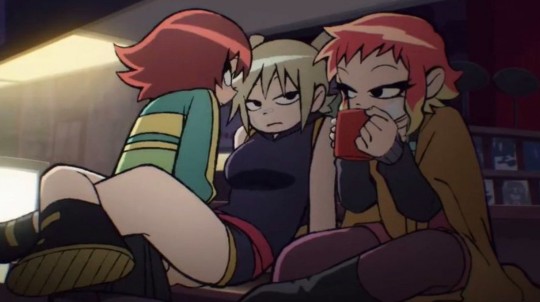
What really matters about this scene is not the kiss itself, but what precedes it. Not even just the fight scene just before it, but what precedes the whole anime series, really. And that's the Scott Pilgrim comic book, and the live action movie. Because in both, Roxie is a punchline.
She's a joke. Her character starts and ends with "one of the exes is actually a girl, I bet you didn't expect that." Jokes are made about Ramona's latent bisexuality, the movie especially treating it as funny and absurd, and her validity as a romantic interest is entirely written off by Ramona as being "just a phase." There's a fight scene, she's defeated by a man giving her an orgasm which implicitly calls her sexuality into question (come on), and the movie just moves on. It sucks. It really, really sucks.
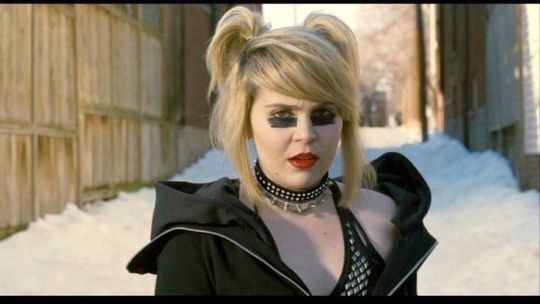
The comic fares a little better. It never veers into outright homophobia like the movie does, and while the line about Ramona having gone through a phase remains, Roxie actually gets one over on Scott when Ramona briefly gets back with Roxie. But Roxie is still only barely a character. Like all the other evil exes, she's just a stepping stone towards the male protagonist's development. She barely even gets any screentime before she's defeated by Scott's "power of love." But Roxie stands out, since she's the only villain who is queer, or at least had been confirmed queer at that point (hi Todd). In a series that champions multiple gay men in the supporting cast, the single undeniable lesbian in the story is a villain. She's labeled as evil, made fun of, pushed aside in favor of the men, and then discarded. Her screentime was never about her, or her feelings for Ramona. It was about the straight, male protagonist needing to overcome her. And that was Roxie Richter. An unfortunate victim of the 2010s.
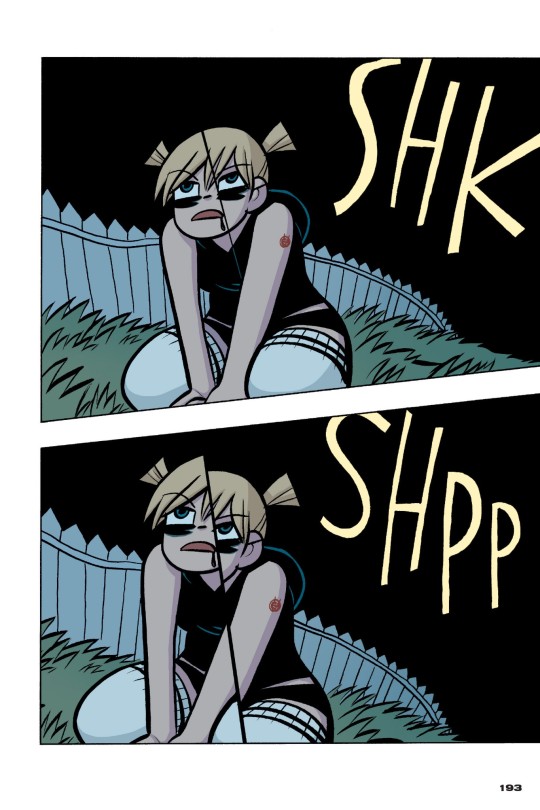
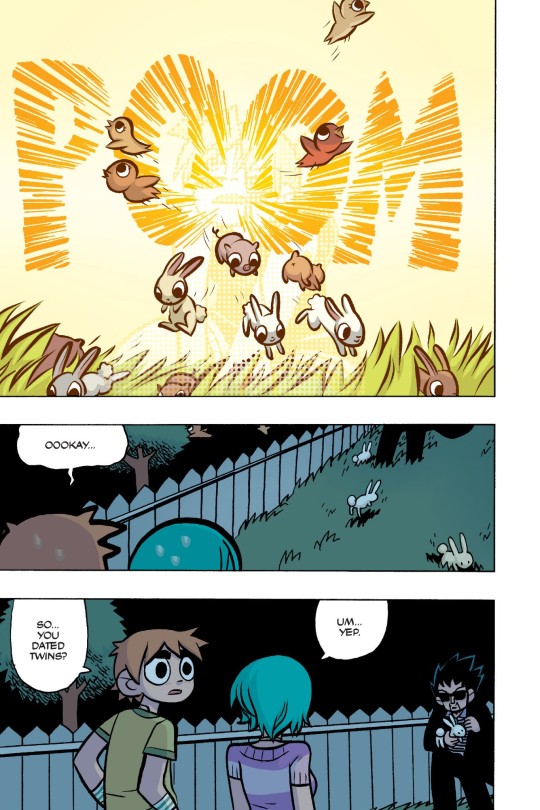
Fast forward to current year, and the new anime series is announced. Everybody sits down to watch the new series expecting another retelling of the same story, and.... hang on, that straight male protagonist I mentioned just died in the first episode. And now it's humanizing the villains from the original story. And there's Roxie, introduced alongside the other evil exes in the second episode, and she's being played entirely straight, without a punchline in sight. No jokes are made about her gender, no questions are made of her validity as one of Ramona's romantic interests. The narrative considers her important. In one episode, she already gets more respect than she did in either of the previous iterations of Scott Pilgrim. And this isn't even her focus episode yet... which happens to be the very next one.
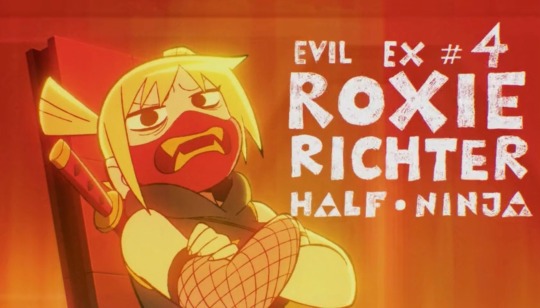
The anime series goes to great lengths to flesh out the original story's villains and to have Ramona reconcile with them. And I don't think it's a coincidence that Roxie gets to go first. While Matthew Patel gets his development in episode 2, Roxie is the first to directly confront Ramona, now our main protagonist. This is notable too because it's the only time the exes are encountered out of order. Roxie is supposed to be number 4, but she's first in line, and later on you realize that she's the only one who's out of sequence. She's the one who sets the precedent for the villains being redeemed. She's the most important character for Ramona to reconcile with.
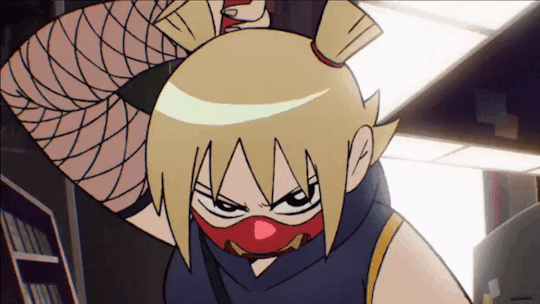
What follows is probably the most extensive, elaborate 1 on 1 fight scene in the whole show. Roxie fights like a wounded animal, her motions are desperate and pained. Ramona can only barely fight back against her onslaught. Different set-pieces fly by at breakneck speed as Roxie relentlessly lays her feelings at Ramona's feet through her attacks and her distraught shouts. And unlike the comic or the movie, Ramona acknowledges them, and sincerely apologizes. And the two end up just laying there, exhausted, reminiscing about when they were together.
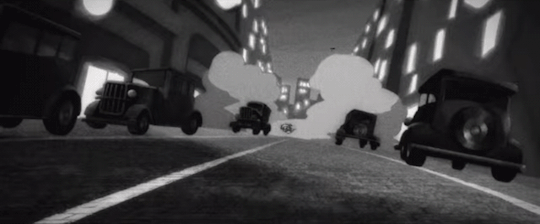
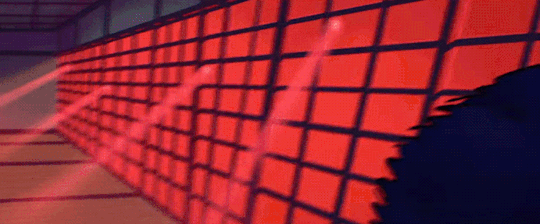

Only after this, after all of this, does the kiss scene happen. Roxie has been vindicated, she has reconciled with the person who hurt her, the narrative has deemed that her anger is justified and has redeemed her character. And she gets her victory lap by making the nearest other hot girl question her heterosexuality, sharing a sloppy kiss with her as the music triumphantly crescendos.
It's... a little self-congratulatory, honestly. But it's good. It's redemption for a character who had been mistreated for over a decade. And she punctuates the moment by being very, very gay where everyone can see it, no men anywhere in sight. Because this is her moment. And then she leaves the plot, on her own accord this time, while humming the hampster dance. What a legend. How could anything be wrong with this.
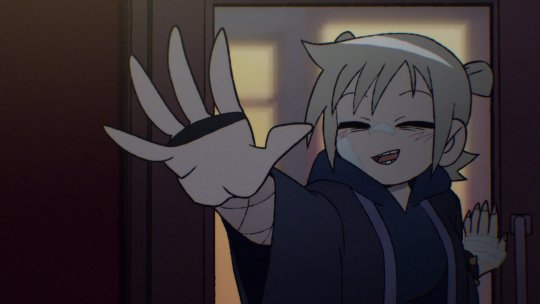
#scott pilgrim#spto#scott pilgrim takes off#roxie richter#roxanne richter#scott pilgrim spoilers#spto spoilers
19K notes
·
View notes
Text
The Importance of Studying Queerness in Context.
When studying queer history, one always has to keep in mind two seemingly contradictory things: firstly, that queerness and queer people have always existed, but at the same time, that queerness and queer identities have not always existed the way they exist today.
Modern queer terms and identities did not exist to queer people in the past. They would not have thought of themselves as "gay" or "trans" or even "queer." While these modern terms may seem to fit certain historic individuals, these individuals would not have thought of themselves as such, and it would not be a part of their lived experience. To apply the modern identities of queerness to history is to erase the lives and experiences of queer people in history, and care must always be taken to understand queer history within the context of its time.
When looking at queer history online, there is a *lot* of misinformation and misidentification out there simply because people are eager to apply modern queerness to history, often in places where it doesn't belong.
A lot of old photos get misidentified as gay because they show two people of the same sex showing some level of physical affection towards each other. Okay, I'll admit that the open-mouth kissing photobooth pictures are probably actually gay, but an old picture of two men or two women holding hands or with their arms around each other, or even kissing on the cheek, were common shows of platonic affection.




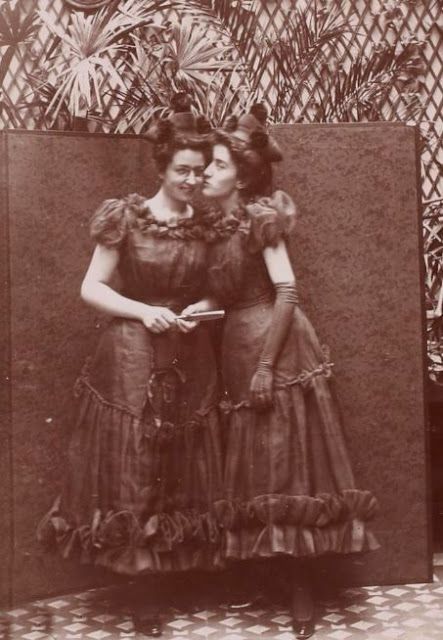

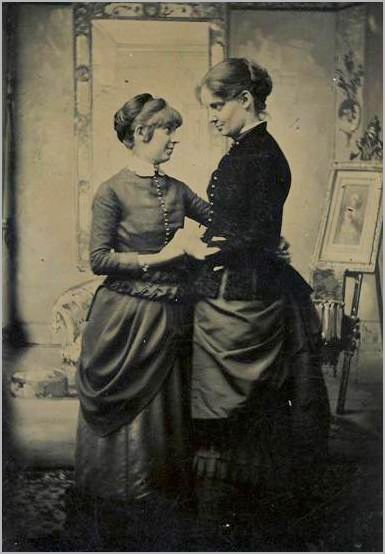
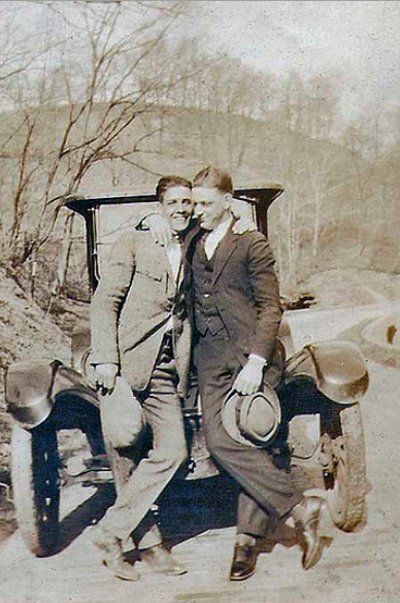
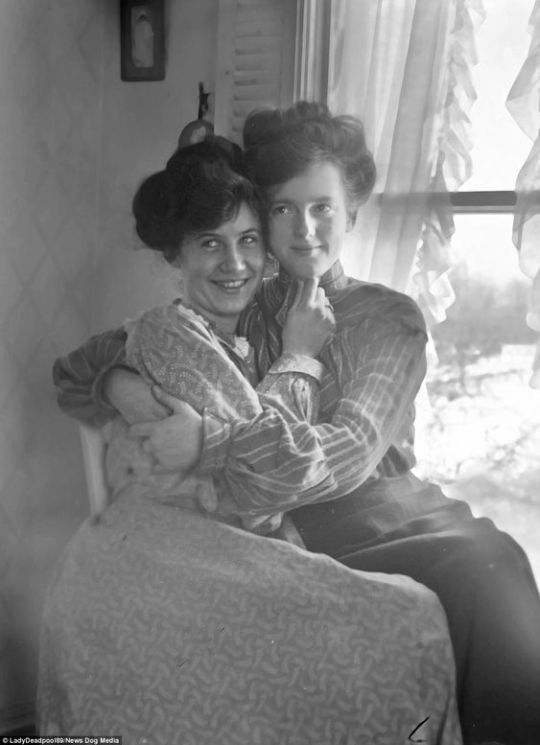
I hate to break everyone's gay little hearts, but without explicit documentation saying so, assuming that these couples are all gay is putting modern queer identity in places where it simply didn't exist. The women in the final picture are sisters. The "not married" boys are bachelors interested in marrying women.
In the silent film Wings, the emotional climax of the film comes in the form of a kiss exchanged between the characters played by Jack Powell and David Armstrong. It often gets attributed as the first gay kiss in cinema history, even on the fucking YouTube clip I found:
youtube
Except it isn't gay. The two men spend the whole film fighting over who gets to be Clara Bow's boyfriend. When Richard Arlen's character is fatally wounded, his dear friend rushes to his side and kisses him goodbye, because in the 1920s, that was considered the ultimate show of friendship. The movie ends with Jack Powell falling in love with Clara Bow.
Similarly, a kiss shared between Lillian and Dorothy Gish in the 1921 movie Orphans of the Storm often gets attributed as being queer, but it wasn't.
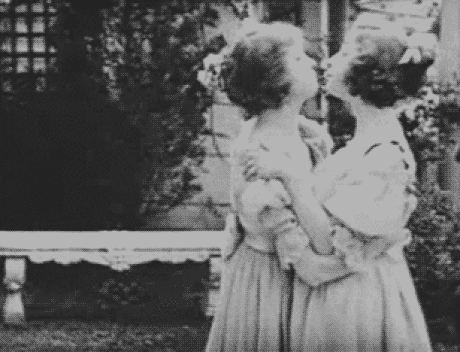
They were sisters playing sisters. None of this was considered unusual.
Pooh-poohing on all of these images that so many people on the internet breathlessly and joyously laud as proud gay history isn't fun. It makes me feel like I'm fucking Ben Shapiro. But if misinformation is allowed to flourish, it allows people like Ben Shapiro to come in and make the argument that queerness is a modern invention and queer people didn't exist in the past.
Everyone loves to see queerness represented in history, but the fact is that none of the stuff in this post would have been seen as explicitly gay and thus shouldn't be called gay today. If we are to understand queer history in its fullness and richness, it is absolutely crucial that we get it right. We owe it to our queer ancestors to recognize, honor, and not embellish the actual lives they lived.
3K notes
·
View notes
Text
this is one is important as fuck i see so many people not understand this and it drives me crazy
"Sburb ruins, mythic challenges, and personal quests generally tend to come off as shallow busywork, stage props, or set pieces in a spurious Hero's Journey. Rose either faintly glimpses this truth at this early stage, or she's just hitting her rebellious teen stride. Either way, she doesn't take the surface value of the quest seriously at all, and only wants to smash it apart and loot the secrets. My sense is that the average reader reacts to this impulse unfavorably. Because readers watch the formula play out so often, they are trained heavily to respect the journey of the hero, to anticipate and crave its fulfillment, to see it as something verging on contractual in their relationship with a story. So a gut-response to this recklessness is like, "ROSE, NO! STOP THAT! You simply must complete your quest and play the rain!" What comes with this view is the feeling that her evolution as a character is only being delayed for a bit while she gets some anti-narrative foolishness out of her system, and then we'll get down to business and watch her do her quest, play a whole BUNCH of rain, and reap the narrative satisfaction. There's just one problem: she never does that. This candy-coated Kiddie Kwest is at no point ever taken seriously by Rose or the narrative itself, nor should it be.
When trying to parse character arcs, we look out for certain beacons. So when we hear "play the rain," we're like, ah, GOT IT. That's Rose's arc. Once she finally gets over this destructive teen bullshit, she can wise up, play the rain, and her arc will be finished. Wrong. This is almost a red herring arc. Her quest on this planet, its patronizing presentation, its intrinsic shallowness, is a mirage surrounding her that represents a fully regimented series of milestones for achievement and personal growth, much as society dubiously presents to young people in many forms. The true arc-within-the-arc is actually an upside-down version of what it appears to be. What Rose is doing now, which seems to be misguided recklessness taking her further away from the truth of herself, is actually better seen as a good start to her real journey: breaching the mirage of regimented growth, exposing it for the charade it is, and pulling the truth out of it. The real conflict in her arc comes not from the fact that she refuses to take it seriously, by destroying it and taking shortcuts. It's the opposite. It's that, upon trashing her planet, she continues to have this nagging sense that she should be taking this quest seriously, much like how a young adult may have a nagging sense of guilt that they aren't "being an adult right" by the time they approach adulthood. And this nagging, unanswerable guilt arises from the truth that the regimentation of adulthood is completely fake. It was always a mirage. Learning this, making peace with it, is part of the growing process for many, and it is for her too." -Andrew Hussie
intrinsically queer as fuck, too, btw
#sams reading homestuck again#homestuck#rose#i also see this in particular interpreted as a 'writing mistake' from hussie#no. its on purpose.
4K notes
·
View notes
Text
Why I Love Hanamusa
I get this question very frequently but have never given a really in depth, definitive answer. All just kinda implied through my comics and spread out asks. So here's this I guess! Long post ahead:
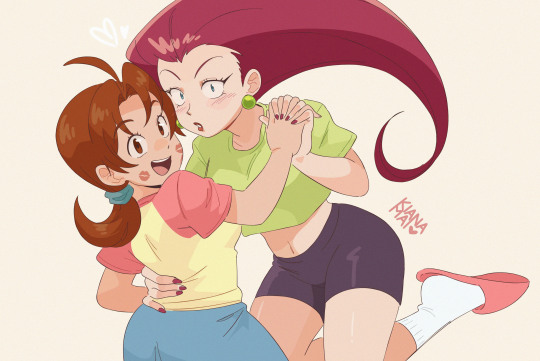
First, as a Pokémon fan in her mid 20s, I love seeing a ship where the characters are both in their mid/late 20s. Already, they’re much more relatable to me and my current experiences. Most Pokémon ships are between preteens, which can be cute but ultimately don’t interest me as much as they used to when I was a kid myself. Not enough to get super invested in and draw a lot of fanart for anyways haha.
I’ll also start by saying that canon doesn’t always influence whether or not I’ll ship something. I’m much more drawn to potential. Could the characters work together? Do their personalities work together in a nice way? I feel like this so much of fanon is anyways. Especially with queer relationships because they’re rarely depicted in the first place. A lot of the context for these ships is usually up to the fans to piece together or make up in general. And that’s the fun part to me!
Jessie and Delia have only met in the anime a handful of times. Any interaction they’ve had has either been pleasant, or just a typical Team Rocket interaction, with Delia dismissing them/not seeing them as a threat. Already a great jumping off point for me since, truly, they don’t have any actual beef or true, ill feelings towards each other. It’s not TOO out of the realm of possibility for them to potentially fall for each other. “But Jessie chased Delia’s son around trying to steal his Pokémon!” That’s where that dismissive and aloof attitude that Delia has comes into play. I’ll go more into Delia’s whole deal a bit later but I do think this aspect of her personality is a large reason why this ship can work. It’s not that she doesn’t care that Jessie has a bad past, but she can tell that, on the inside, Jessie’s a good person. And, in a scenario where Jessie is trying to become a better person, is forgiving enough to give her a shot. I feel like this is such a solid foundation for a ship. A character who has done wrong but is trying to be better and another character who is willing to help them be better. A classic dynamic!
It’s not just one-sided though; where Jessie is the only one benefitting and learning from the relationship. I believe Delia could get a lot out of being with someone like Jessie. To understand why, I think it’s important to know these characters’ respective backstories.
Jessie is an orphan/foster child who grew up in poverty. Her mother Miyamoto (from The Birth of Mewtwo) was a Team Rocket operative herself, who went on a mission to find Mew. In order to do this, she had to leave Jessie when she was just a toddler. Unfortunately, Miyamoto went MIA on her mission leaving Jessie to more or less fend for herself. Jessie went through life with zero stability, evident by her MANY different careers and constant moving around. It’s implied in the show that she went from foster home to foster home, and later in life tried being an idol, weather girl, florist, wine connoisseur, actress, most notably a nurse and finally a Team Rocket field agent. And even while in Team Rocket, she, James and Meowth were always doing odd jobs to get by. We see that Jessie used to be a sweet kid, and even adult, but the world and her circumstances repeatedly did her dirty, leading her to become the character we know today. Hot tempered, mean, selfish, etc. But despite this, her soft side does still shine through for the people and Pokémon she cares about. She is incredibly loyal.
Delia, unbeknownst to a lot of fans, also had a rough past (see Pocket Monsters: The Animation). Like Jessie, she had a lot of dreams and aspirations like wanting to be a model and even a trainer. But when she was 10, her mother didn’t let her, telling her that she had to stay home and learn to run the family restaurant (she’s an only child). Delia’s father left her and her mother to be a trainer, and never returned. When she was 18, she married Ash’s father and became pregnant shortly after. But right after Ash was born, he also set off to be a Pokémon trainer. And soon after that, her mother passed away, leaving Delia with just the restaurant and baby Ash. This gives so much context to Delia’s attitude in the show. We see that Delia is pained whenever Ash leaves on a journey, but she never shows that pain to anyone. ESPECIALLY Ash. She’s very quick to shoo him off when he shows any sign of wanting to go on another journey and even when he returns home, she acts more excited to see Pikachu than him almost every time. Without all this backstory, it’s easy to just read this as a funny gag, BUT with context, I think it really shows how quickly Delia shuts down and detaches in order to not confront her own feelings. She’s afraid of losing people and getting hurt again.
All that said, I think Jessie and Delia provide each other with EXACTLY what the other needs.
Aside from becoming rich and famous, Jessie’s biggest aspiration is to get married. In my opinion, this is more so an underlying want for love and stability. There is no one more stable in the show than Delia. Delia’s lived in Pallet her whole life, she’s worked at the same restaurant since she was young and she is always there when Ash comes back home. She has all the love, patience and stability Jessie needs and craves. While forgiving, Delia’s not stupid and can keep Jessie in check. Delia’s also just an angel, which I feel, would make Jessie want to be better. And on top of all this, on more of a surface level, Delia’s a chef and excellent cook. She shows love through cooking and Jessie, who grew up poor, regularly starving and eating snow, happily receives that love. Jessie’s able to live a happy and healthy life with someone like Delia.
Delia, as stated, is very stable. Likely pretty monotonous and solitary, especially living in such a small town like Pallet. This isn’t a bad thing but it’s a little sad when you consider that Delia also had dreams of traveling, being a model and a trainer. She had to give up so many dreams in order to fulfill her duties as a restaurant owner and mother. And even now, when Ash is off on his journey, she feels the need to always be home and be that stable pillar, leaving behind any ambitions she had, thinking it’s too late for her (she’s only 29 btw). But then along comes Jessie, dangerous, passionate, an absolute firecracker. Someone who’s whole life has been about chasing dreams and either, never giving up on them or finding a new dream to chase. Upon learning about Delia’s past aspirations, I could see Jessie pushing her towards them, letting her know that life’s too short and she has nothing to lose from trying. On top of this, Jessie’s also loyal. She, James and Meowth are depicted as doing anything for anyone who gives them food or shows them kindness. Delia does both so there’s no way Jessie would leave her. This fulfills an essential need for Delia, who is afraid of the people in her life leaving her.
There’s so much potential for mutual growth and learning between these two and I adore that. They compliment each other, they help each other and they bring out the best qualities in one another.
I’m not really sure how to end this and I could truly talk about them even more but I don’t want this to be tooooo long haha. OH I could end it with maybe the most funny aspect of this ship that I've brushed over and also what drew me to it in the first place. Jessie. As Ash’s stepmom. THE END.
2K notes
·
View notes
Text
A significant amount of my opinions about modern queer television are influenced by researching older queer media.
I see a lot of the same vitriol in modern queer fandom discourse that has been playing out in queer spaces since film and television were invented. Shows in the 70s started making steps toward sensitivity consulting in queer media, even as the networks fought them on it. Imperfect but earnest queer representation was met with aggressive protests by homophobes and queer people who thought it wasn't good enough. The argument over good representation vs no representation has been happening for decades and decades.
You spend enough time immersed in old queer media and you really start to vibe with Harvey Fierstein's words in The Celluloid Closet documentary. Or at least, I do.
youtube
Harvey Fierstein: "I liked the sissy. Is it used in negative ways? Yeah, but, my view has always been visibility at any cost."
The way I see it, the way to genuine, loving queer representation that showcases a vast array of experiences is to stop demanding perfection. The fewer queer stories that are allowed to exist, the more of the heavy lifting those stories have to do in the representation department.
When we have numerous queer stories, it's suddenly much less important to argue over whether the queer characters in question are "good" or "positive." They can just be queer characters who exist in the same infinite variety as straight characters. They can be messy, they can be flawed, they can be honest portrayals of the complexity of human existence.
Queer representation will never be perfect, and striving for perfection is how we shoot ourselves in the foot.
Some starter reading for those interested:
Alternate Channels: Queer Images on 20th-Century TV (revised edition) - Steven Capsuto
Hi Honey, I'm Homo!: Sitcoms, Specials, and the Queering of American Culture - Matt Baume
The Celluloid Closet: Homosexuality in the Movies - Vito Russo
2K notes
·
View notes
Text
been seeing some stuff on blue eye samurai and big yikes to nearly everyone pushing extremely western ideals onto these characters.
this is early edo period. 1600s. the japan you know now did not exist yet.
yall. please. there was NO concept of sexuality in pre-modern japan. that came with both the influx of christianity and western influence very very late in history. like, mid-1800s. (yes, there was christianity pre-1800s but it was not a widespread idea yet and wouldn't be until about the 1800s since, y'know, missionaries were routinely murdered before then)
"so and so is either bi and hasn't figured it out yet or..." no. that isn't how it worked then. nobody gave a shit what was between your legs. anyone could be attracted to anyone else. it was a little more common for male homosexual relationships to be between an adult and younger male - like many other places around the world - but two adult men could bang and love each other just as easily. relationships between women were quite common - especially since so many men were often away at war. there's tons of pornographic prints from the time depicting all manner of fun queer relationships. sex itself had absolutely no moral assignment to it. good sex was good health. it didn't matter who with. (well, social class/caste mattered more than anything else tbh but that didn't stop upper and lower class from fucking.)
that isn't to say people didn't have preferences. of course they did. that is human nature. preferences arose more from physical appearance, caste, and circumstances with gender being about the last thing one would look for in a partner - romantic, casual, or otherwise. the only role in sex where gender actually mattered was for procreation.
there would be no queer awakening moment, no sudden switch flipped, no stigma to have internal conflicts about because it simply did not exist as a concept whatsoever. you were either attracted to a person or you weren't, it was that simple. gender played no role when it came to sex and sexual attraction. the japanese were lightyears ahead of western cultures in this particular area - like most cultures were before christianity came in and ruined everything with its backwards morals and strict good/evil dichotomy.
yall have got to realize queer rep will not and should not always adhere by modern western standards.
there was no straight, gay, bi, or anything else of the sort. the closest they ever got was referring to roles during sex - as in who is giving and who is receiving.
i know this is mostly a made up story but it is still set within a very specific time period and culture, which should be honored and respected by not making it fit into our box. tons of research went into making this show historically accurate (albeit with some discrepancies but tbh they aren't really that huge) right down to the calligraphy writing. please please please don't whitewash the culture from these characters.
i say this mainly because without this knowledge, so many of you are going to build these characters up on a foundation they aren't meant to be on and then you'll rage about queerbaiting and bad queer rep if it isn't somehow super explicitly stated, if it doesn't match your very modern, very western ideal of what queer looks like. don't try to force this plot and narrative and characters into something they canonically and historically aren't. headcanons are a thing, AUs are a thing, fanfiction is a thing - leave your western thinking for those and let these characters simply exist as they should otherwise. this is one of those times where the queerness really does not need to be examined at all beyond what we get.
i know it can be hard to wrap your head around - sexuality is such a huge part of our identity in the western world and has slowly started to spread amongst other parts of the world in importance. but just keep in mind with these particular characters, that concept would be so very alien to them.
2K notes
·
View notes
Note
What flavor of queer are you, if that's not too invasive of a question?
question is just fine with chuck it is kind of interesting story.
on LGBTQIA trot i am TECHNICALLY two letters
easy first one is B that does not need any more explanation. that has always been my trot
second way is what i have learned through talkin with my online buds way of non-dysphoric trans. it has taken chuck LONG time to understand this but it has been fruitful journey i think. long ago chuck would post online about becoming other people or things or concepts or wrestling with my IDENTITY as a buckaroo (whether that meant becoming sweet barbara or becoming my reverse twin or becoming the entire seahawks footballs team, very handsome). in fitting with my entire heckin LIFE some buds probably thought these were jokes when they were not at all. they were just personal artistic bubbles tumbling up and popping in ways i didnt understand yet.
but through posting these thoughts and THEN writing trans tinglers and talking to my trans buds online, i started to realize there are all kinds of versions of a trans identity INCLUDING the ones that rolled around deep inside of me that i never had a name for.
three events helped chuck understand this
first: the trans buds chuck talked to while researching harriet porber said 'well i always knew if i could press a button and change my body to match my gender i would instantly do this' and chuck thought 'of course woudlnt we all do this?' and they said 'well no, do you feel this way?' and i would say 'yes very strongly'. i will FOREVER be grateful to trans community for these conversations and maybe it is another reason why being anti-gatekeeping is so important to chuck.
second: thought about all the games i have ever played like a dang videogame or a role playing game, chuck would ALWAYS choose ladybuck character. didnt really think this was a unique thing at time but it is a pattern across whole life
third: chuck was trotting around with some buds and they all said 'whose bod would you choose if you could transform into any body?' (this is common topic for chuck believe it or not.) and the buckaroo guys went around naming the usual brats pitt or handsome channing and it got to chuck and i said 'obviously brie larson' and then the dang guys just kind of stared at chuck and then i realized 'oh, i didnt even think my answer was unusual but i guess they were only talkin guy bods'
these three things happened pretty close to one another but they were all bubbling up for decades and expressed in various ways even chuck did not entirely understand
anyway. chucks way is NOT that i feel uncomfortable in my body and it does not bring me grief. i am not upset about it honestly. i do not even THINK about it most days. however, it is all TRUE and in a purely technical and utilitarian sense of A PLUS B then YES, male would not be my preferred gender.
didnt talk on this for a while because there are MANY dysphoric trans buckaroos who go through a lot of hardships and i have gone through ABSOLUTELY NONE IN THIS WAY. it has not made my life more difficult and it does not haunt me, so i do not want to have my voice drown out other trans buds who need space to shout. i am very privileged so even though technically this applies to chuck i do not need or want any bonus points.
that beings said, part of my journey on the autistic spectrum was to recognize that EVEN THOUGH my personal story is not tragic, it is still an important one to get out there onto this timeline. IN FACT there should be more stories of buckaroos who love being autistic like chuck. i am PROUD of my trot and i love my autism (this is also why i wanted to explicitly say my lead character in camp damascus is autistic)
so in the same way, when directly asked, i will say: i am technically non-dysphoric trans ALSO this has not weighed on my life at all. my story is not tragic it is full of joy and excitement. i will not shy away from this because there are all kinds of buckaroos on this spectrum.
anyway that is my VERY LONG TROT hope you enjoyed getting to know chuck a little more thank you for this question buckaroo
#chuck tingle#tingleverse#love is real#camp damascus#trans#lgbtq#bisexual#autism#non-dysphoric#buckaroo lifestyle#queer
14K notes
·
View notes
Text
I need Neil Gaiman to know that Good Omens 2 made me feel emotions I haven't felt in nearly a decade.
When I heard there was going to be a Good Omens 2 I was looking forward to it, of course. I just wasn't expecting it do anything super special to my emotions. I was sure I'd enjoy it, though. I really enjoyed s1.
But, for the last few years, I watched shows and afterwards basically thought well, that was fun, and I quickly moved on and didn't think much about them. There was only about 3 shows in the last 5 years that had made me feel truly emotional and stayed on my mind to the point where I felt like I needed to engage in fandom for a while. (Good Omens 1 was one of them.)
I wasn't spoiled by the leak. I never even knew there was a leak. So I had no idea what was coming in s2. And oh boy...
See, I'd watched Our Flag Means Death, a show where you don't expect the lead characters to kiss, because, well, that never happens in these types of shows, right? And this is important because when they did kiss, it felt like a door that had been locked with just about all the high security locks in the world had suddenly, inexplicably, been opened. Something switched inside me. It took me months to understand what it was, but when I thought about Good Omens before s2 came out, I realized what it was.
I would never truly enjoy a bromance they're-only-queer/in love-by-your-own-interpreation story ever again. Stories where nothing is confirmed, just subtext that anyone who doesn't want to see it can easily deny and mock those who wish it was more.
While it was clear that Crowley and Aziraphale cared a lot about each other in s1, and were probably in love, it was still just a fun ship for fans to play with in fanfiction and fanart. Do they love each other? Oh sure. In what way? Well, that's up to interpretation. Ok, cool. But it's not quite Our Flag Means Death, is it?
Then I watched Good Omens 2. And from episode 1 I saw my favourite Angel and Demon duo love each other. And I was having the best time. I hadn't had such a good time watching a show in a long while. It was not only right up my alley, it was an alley I wasn't even aware was my alley until I saw it. I enjoyed seeing the old characters, the new characters. Oh, I was wonderful.
It was clear to me that, of course Crowley and Aziraphale love each other, are IN love with each other, showing it in their own way. And I wasn't expecting it to be THIS obvious.
And then when the kiss happened, I couldn't believe it. I covered my mouth with both hands and gasped and sat up straight in my seat. I had never expected it--the heartbreak it added to the already heartbreaking scene--it rewired something inside me.
It was like my emotions had been locked up in a stall like a horse for so, so long, and now the gate had been opened, the stable door kicked down, and the horse was running out onto the large pasture into the daylight, bucking and kicking up grass. Oh my god, I have to take a few minutes to process that entire 6 hour marathon of emotions.
And by a few minutes I meant a few days.
More than a few, actually.
I didn't need a kiss to understand how much they loved each other, but I did need the kiss to understand how intense and heartbreaking their separation is for them after everything.
But more than that, the kiss broke a barrier. They really did it, I thought. They really dared.
Aziraphale and Crowley aren't human males, no, but they're played by male actors. And that is significant. That makes the kiss significant. In the world we currently live in.
Weeks later, I'm still obsessed with the show, re-watching s1 and 2, reading the book again, listening to the audio drama. And I'm on tumblr, seeing people's posts and art to somehow sate my hunger for a s3 that doesn't exist (yet).
And I'm having a wonderful time.
#good omens#good omens 2 spoilers#go2#neil gaiman#im queer and emotional#NEIL LIKED IT?!#asdsdksfksnvkjdnvdkjvd
2K notes
·
View notes
Text
Good Omens is queering TV/storytelling - part 1: GAZE

I would argue that part of why Good Omens is so refreshingly queer is because it does not cater to the male gaze (which centers around the preferences - aesthetic, romantic, sexual, visual, logical, emotional, political ... - of mainly white men in positions of power):
no oversexualization of groups or types of people: Women or characters that could be read as female presenting are not overly sexualized. In fact, some of them are shown to be grimy, slimy and not sexual at all. All of them are real characters and not just cardboard-cutout on-screen versions of male misogynistic fantasies. They portray real people with real people problems. They are human, or exempt from our categories when portraying angels or demons. There are no overly sexualized bodies in general (as has so far also often been the case with young gay men, PoC, etc.), no fetishization of power imbalances, and not exclusively youthful depiction of love and desire.

sex or sexual behavior is not shown directly (yet): All imagery and symbolism of sex and sexuality is used not to entice the audience but is very intimately played out between characters, which makes it almost uncomfortable to watch (e.g., Aziraphale being tempted to eat meat, Crowley watching Aziraphale eat, the whole gun imagery).
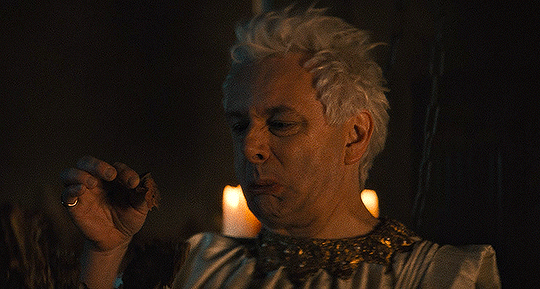
flaunting heteronormativity: Throughout GO but especially GO2, there is very little depiction of heterosexual/romantic couples; most couples are very diverse and no one is making a fuss about it. There is no fetishization of bodies or identities. Just people (and angels and demons) being their beautiful selves (or trying to).
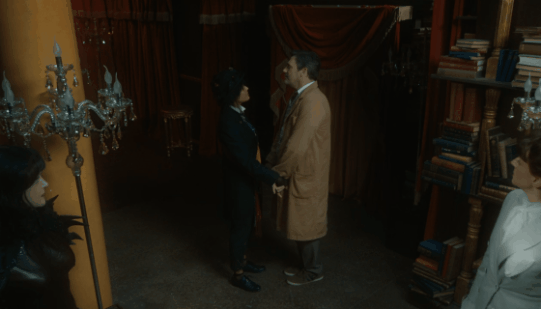
age: Even though Neil Gaiman explained that Crowley and Aziraphale are middle-aged because the actors are, I think it is also queering the idea of romance, love and desire existing mainly within youthful contexts. Male gaze has taught us that young people falling and being in love is what we have to want to see, and any depiction of love that involves people being not exactly young anymore is either part of a fetishized power imbalance (often with an older dude using his power to prey on younger folx) or presents us with marital problems, loss of desire, etc. – all with undertones of decay and patronizing sympathy. Here, however, we get a beautifully crafted, slow-burn, and somehow super realistic love story that centers around beings older than time and presenting as humans in their 50s figuring out how to deal with love. It makes them both innocent and experienced, in a way that is refreshing and heartbreaking and unusual and real.
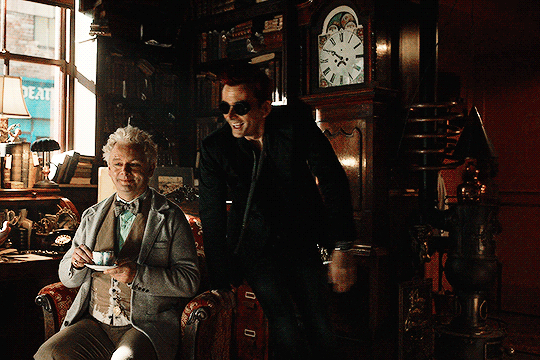
does not (exclusively) center around romantic/sexual love: I don’t know if this is a gaze point exactly but I feel like male gaze and resulting expectations of what a love story should look like are heavily responsible for our preoccupation with romantic/sexual love in fiction – the “boy gets girl” type of story. And even though, technically, GO seems to focus on a romantic love story in the end, it is also possible to read this relationship but also the whole show as centering around a kind of love that goes beyond the narrow confines of our conditioned boxed-in thinking. It seems to depict a love of humanity and the world and the universe and just the ineffability of existence as a whole.
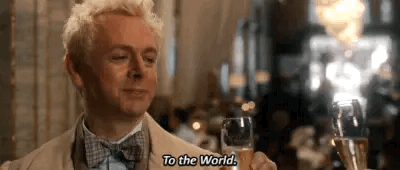
disability as beautiful and innate to existence: Disability is represented amongst angels by the extremely cool Saraqael and by diversely disabled unnamed angels in the Job minisode. Representation of disability is obviously super important in its own right, but is also queers what we perceive as aesthetically and ontologically "normal". Male gaze teaches us that youth and (physical and mental) health are the desirable standard and everything else is to be seen as a deviance, a mistake. By including disability among the angels, beings that have existed before time and space, the show clearly states that disability is a beautiful and innate part of existence.
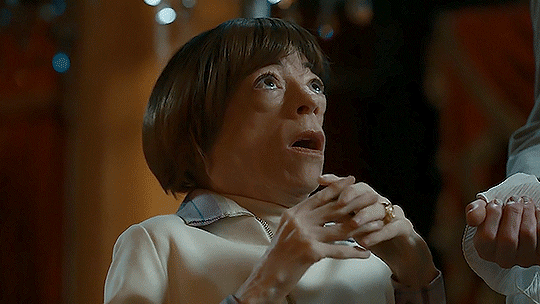
gender is optional/obsolete: Characters like Crowley, Muriel and others really undermine the (visual and aesthetic) boundaries of gender and the black-and-white thinking about gender that informs male gaze. Characters cannot be identfied simply as (binary) men or women anymore just by looking at them or by interpreting their personalities or behaviors. Most characters in GO, and especially the more genderqueer ones, display a balance of feminine and masculine traits as well as indiosyncracies that dissolve the gender binary.
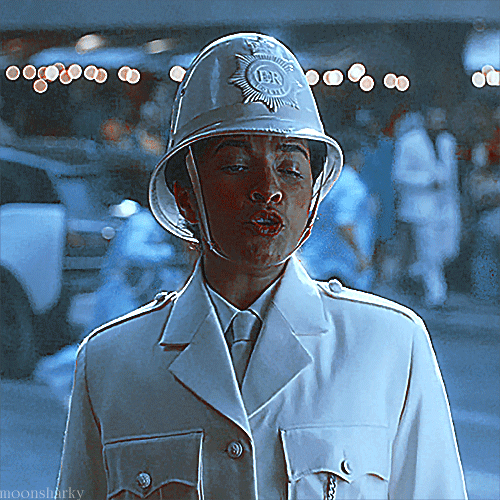
Feel free to add your own thoughts on this in the comments or tags!
#good omens s2#good omens#good omens 2#go2#good omens meta#ineffable husbands#crowley#aziraphale#queer#queer TV#male gaze#thank you neil gaiman for cranking up the queer#neil gaiman#thank you neil gaiman
2K notes
·
View notes